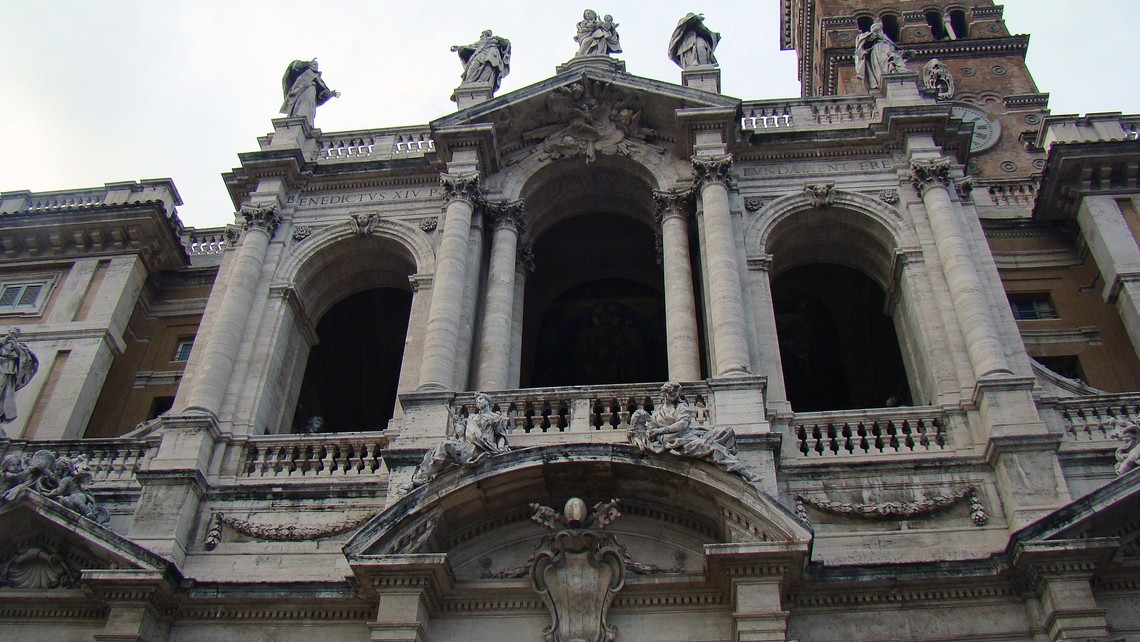
Continuing our discussion of Lent (see Lent and the Acts of Religion), let’s review two important points about the liturgy and its expression in the liturgical year. First: the liturgy is an efficacious drama that includes all of the People of God. It is efficacious because at its most basic level, it is a sort of escape from the bounds of the natural world and makes real when it symbolizes. It is a drama because the liturgy transcends time and space to bring Jesus Christ Himself, effected in salvation history by His saving acts, to concrete people in a particular time and place.
The liturgy is personal and communal (i.e. it is not purely private). When we celebrate the liturgy we experience intimate union with Him and with all of those who call Him Lord, those living and those who have gone before us. In a particular way then, celebrating the liturgy in the liturgical year is an appropriate time to renew sense of our solidarity with our departed loved ones and with all of those in Purgatory.
The liturgy unites humanity (and all of fallen creation) with the eternal life of the Trinity because it is an encounter of intimate communion with Jesus Christ. The efficacy of the liturgy is most fully manifested in the Eucharist, that is, the Sacrifice of the Mass, and every liturgical act receives its efficacy from it. The fathers of the Second Vatican Council put it this way:
Recalling thus the mysteries of redemption [in celebrating the liturgical year], the Church opens to the faithful the riches of her Lord’s powers and merits, so that these are in some way made present for all time, and the faithful are enabled to lay hold upon them and become filled with saving grace (Sacrosanctum concilium, 102).
The liturgical year is a memorial participation in the saving Mystery of Jesus Christ (see also the Catechism of the Catholic Church 1168-1171). All of this means that the liturgy and our celebration of the liturgical year is efficacious for bringing us into communion with Jesus Christ and making us “partakers of the divine nature” (see 2 Peter 1:4).
The drama of the liturgical year derives from the fact that through the liturgical year we enter into the saving acts of Jesus Christ at the same time we are recalling them. This should overcome any mistaken notion that the liturgy is boring. When we celebrate the life and acts of Christ during Advent, Christmas, Lent, and Easter we do not simply recall them, in some way we are drawn up into them.
This is not so much to be understood as our being transported back in time as though we were now living in a time before the grace of the Cross has been poured fourth (this is why the Church has said parishes must stop emptying their holy water fonts during Lent); rather, it is that we are drawn together with the historical acts of Jesus and at the same time with their efficacy, as we participate in celebrating the liturgical year. In a simple phrase, the liturgical year is an efficacious memorial (again, it is efficacious because the celebration of the liturgical year receives its efficacy from its connection to the Eucharist).
This brings us to the second key point, our cooperation with this grace. We must not envision the efficacy in terms of our personal benefit as a sort of automatic, mechanical thing. That is, we do not benefit if we attempt to receive passively (much less unworthily). While grace is given in the Sacraments automatically when they are validly celebrated, the recipient benefits only to the degree he is adequately disposed. That is, the holier one is, the more fruitful the reception will be.
Personal progress in man’s cooperation with grace through intimacy with Christ on His Cross is a central aspect of Christ’s Gospel message and so Lent becomes an appropriate time to refocus our attention on this aspect of the spiritual life. We more fully enter into the drama when we experience something of the Lord’s Passion and we receive its efficacious action when we are more fully conformed to Him. These of course, are the reasons we return, with renewed focus, to the acts of religion during the season of Lent. In our next article, we will take up the most obvious of these acts; namely, fasting.


